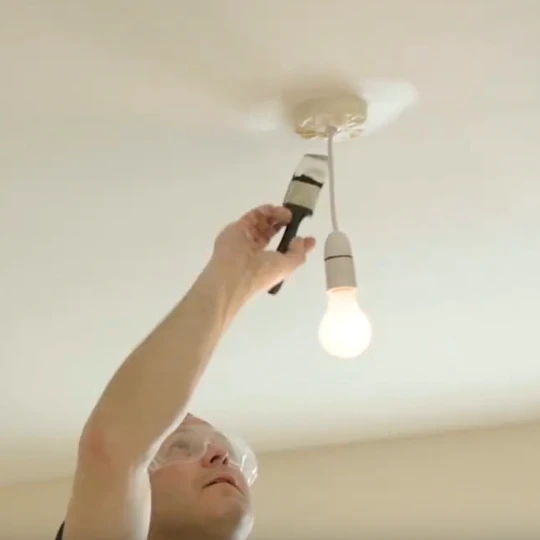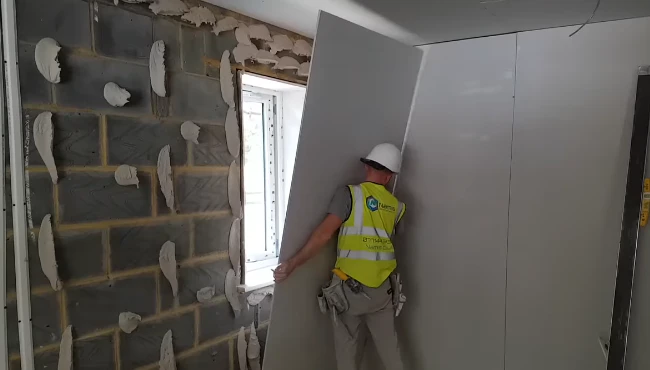What does a painter and decorator do?
Painters and decorators work in a wide variety of areas, e.g. in homes, schools, offices, hospitals, factories and on construction sites. Their main task is to decorate and protect buildings by applying various coatings and wall coverings indoors or outdoors. They work both independently and as part of a team, ensuring a high quality finish in compliance with safety and environmental regulations.
Required skills
To be successful in this profession, you need a range of skills that go beyond wielding a paintbrush. Successful painters and decorators are good problem solvers and communicators. They work both independently and as part of a team, interacting with colleagues, clients and other building trades. A good understanding of paint coatings, wall coverings and compliance with safety and environmental regulations is essential.

Qualifications
Painters and decorators often hold an NVQ level 2 qualification or NVQ level 3 in Decorating and Industrial Painting. Holding a blue CSCS card and gold CSCS card is beneficial as they can demonstrate competence and compliance with safety standards. These qualifications ensure that professionals in this field are equipped with the knowledge they need to excel in their role. Specialization opportunities abound, from historic and listed buildings to new build or commercial work.
Benefits
The profession offers a number of benefits. Painters and decorators can specialize in a variety of projects, such as listed buildings, new homes or commercial work. The profession offers a sense of fulfilment in transforming spaces and contributes to the growth of the construction industry. The career field also allows for specialization, allowing individuals to become experts in their chosen niche. Demand for their skills remains high, contributing to job stability and growth opportunities.
Challenges
While the work is rewarding, it also comes with challenges. Meeting quality standards, adhering to specifications and working at an appropriate pace require diligence. The profession requires a keen awareness of safety protocols, environmental issues and sustainable practices. Painters and decorators must also adapt to different project sizes and types, which requires flexibility and problem-solving skills. Demand for their skills remains high, contributing to job stability and growth opportunities.
Career path and progression
From small family businesses to large construction companies, painters and decorators have a wide range of career opportunities. They can specialize in certain types of projects, gradually becoming masters in their field. There are opportunities for advancement, with experienced professionals often taking on the role of lead or craft painter and decorator, guiding the next generation. As they gain experience, they can also take on supervisory roles or set up their own painting and decorating business.
Statistics
Painters and Decorators in the UK* – Prognosis
Average Annual Increase
ARR**
SOURCE: CITB ” Labour Market Intelligence Report (2024 – 2028)”.
* These prognosis calculations assume constant ARR and growth rate without significant external disruptions.
** ARR – Annual Recruitment Requirement is a metric used to estimate the number of new workers needed annually to meet labour market demands in a specific industry, region, or occupation.
How much could you earn as a painter and decorator
In the UK, painters and decorators can earn a competitive salary. On average, entry-level positions are around £21,000 to £25,000 per year. With some experience, qualified professionals can earn between £33,000 and £37,000 per year. Senior or specialist positions can command higher salaries, which can reach £40,000 and more.
*Information sourced from reputable recruitment sites and agencies, reflecting the latest job market insights and trends. Figures can vary based on factors such as specific job requirements, individual qualifications, and regional economic conditions. Additionally, self-employed professionals should account for expenses such as tools, materials, insurance, and transportation when calculating their net earnings.
Typical hours per week
Standard work hours per week
(Employed)
Working hours per week with overtime
(Employed and Self-employed)
Painters and decorators usually work around 40 to 44 hours per week, although overtime is possible, especially on larger projects. The flexibility of working hours can vary depending on the employer and the nature of the project.
Conclusion
Being a painter and decorator isn’t just about putting paint on walls; it’s a trade that requires skill, precision and creativity. As the demand for new homes increases, the role of painters and decorators in designing the spaces we live and work in is becoming increasingly important. With the right skills, qualifications and a passion for transforming spaces, people in this profession have the opportunity to make their mark on the construction industry.

